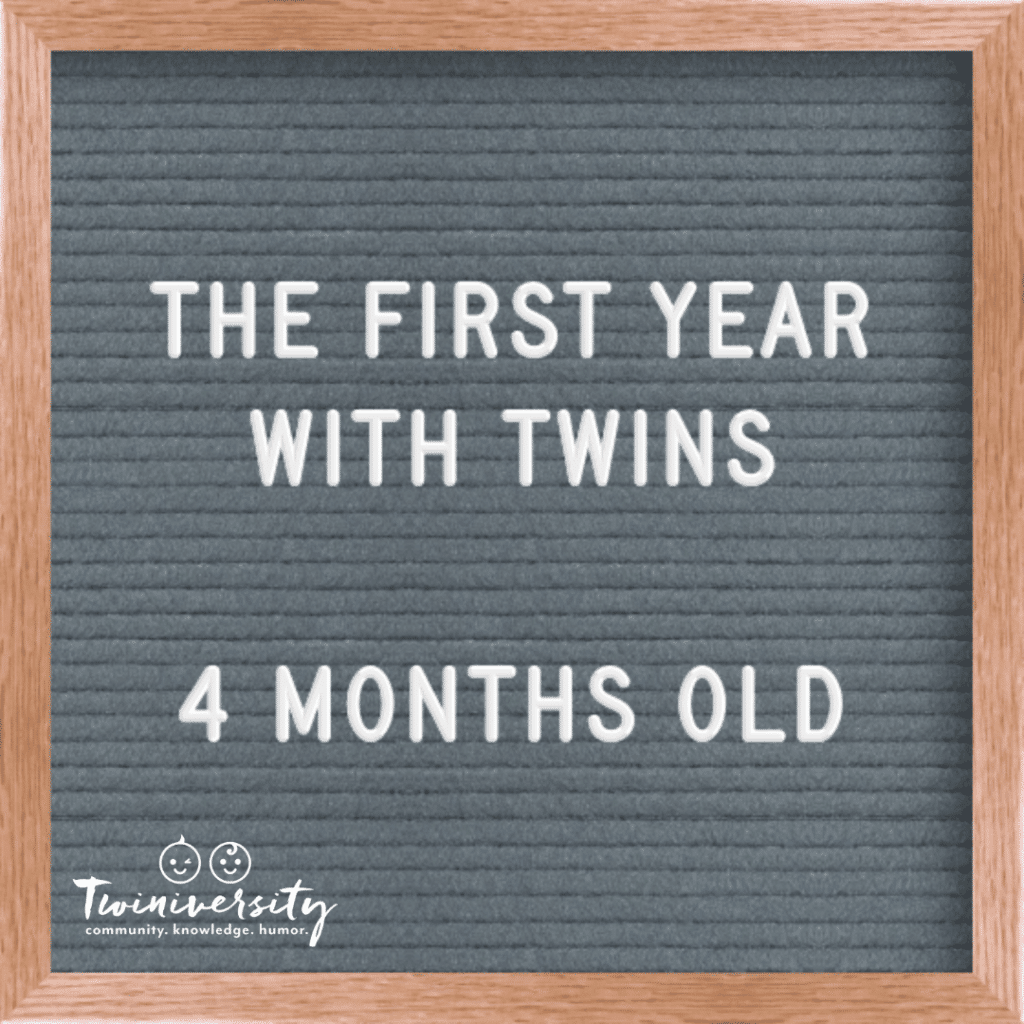Last updated on November 2nd, 2023 at 10:18 am
Learn what to expect with your infant twins 4 months old, including tips, tricks, and advice from real twin parents who have been there.
All content on this website, including medical opinion and any other health-related information, is for informational purposes only and should not be considered to be a specific diagnosis or treatment plan for any individual situation. Use of this site and the information contained herein does not create a doctor-patient relationship. Always seek the direct advice of your own doctor in connection with any questions or issues you may have regarding your own health or the health of others.
Your Twins 4 Months Old
Welcome back returning twin parents! Hello and welcome to the new twin parents who are just finding us today!
You made it through your first three months as a twin parent and you’re now well into your fourth month of twin parenthood. This is a huge accomplishment. Little known secret: we knew you could do it!
Now what? Well, this is a good place to start. We have plenty of information and resources to help you navigate twin parenting with your twins 4 months old.
Our twin parenting tips come from our very own experienced twin parents from around the world! These parents have all been there, done that, and are ready to share their tips and tricks with you.
These first months are full of excitement, questions, and even some anxiety. Not to worry, we’ve got your back. We’ve laid out all our best tips, tricks, and advice for twins 4 months old.
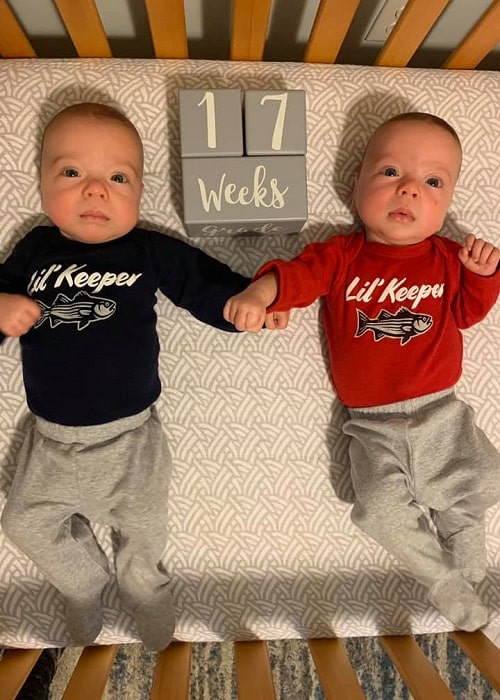
What to Expect with Twins 4 Months Old
- Got preemies? Make sure to consider your premature twins’ corrected age when reviewing whether or not they are meeting their milestones at appropriate times. In the vast majority of cases, preemies catch up by school-age and go on to succeed at the same level as their peers. Read more about preemie milestones here
- Try not to compare your twins to each other, even if they are identical. It’s common for one twin to leap ahead a little on the development front. They may even take turns. It’s very likely that they will motivate each other to hit milestones sooner than they would if they were born a singleton. Monkey see, monkey do! Learn more about trying not to compare twin here
- Your twins may start combining sounds and syllables so that they sound like “words”, but they don’t have any meaning just yet.
- Your twins should enjoy tummy time more now that they are stronger. If they haven’t already, they are about to push up on their arms and support the weight of the upper body, if only for a few moments. Learn how to jazz up tummy time here
- Talk to your twins to help them develop early language comprehension. Tell your twins what you’re doing and describe what goes on around them to help them connect your words with objects and concepts. For example, every time you dress them, say the names for all of their body parts.
- Going back to work soon? Read more about going back to work tips here
- Are you planning to pump at work? Have no clue where to start preparing? We’ve got you covered. Learn more about pumping at work here.
- Your twins’ may soon start to flip over. You’ll start to see them rocking from side to side. They will probably flip from front to back first. When you see them starting to roll, begin the transition out of a swaddle and into a sleep sack (wearable blanket). Try the Love to Dream Transition Bag for when they start to roll (buy on Amazon)
- Your twins may start teething soon. This may cause sleep disruption. Learn more tips for teething here.
- If you’re noticing more drooling, this common when babies are teething and/or if they have a cold/stuffy nose. It’s nothing to worry about, but if you notice a rash forming use Aquaphor healing ointment (buy on Amazon) to keep it under control.
- You may want to start taking your twins to baby classes, story time at the library, and other baby events. Now is a great time to do it while they are still immobile. Once they are on the move it will be very challenging to take them to these events without another adult to help.
- Get ready for that first giggle any day now! Make a fun game of tickling your baby while making a funny sound to get them to laugh with you. This is a fun way to enjoy a little 1-on-1 time with each twin. Right after tummy time is perfect for this!
- Now is a good time to start putting your babies to sleep “drowsy, but awake”. Lay them to bed on their backs while still awake and leave the room. This will help them start to learn how to self soothe. They will probably cry and want to be picked back up, which is OK — you should do that, then settle them down and try again. Just keep trying and don’t feel defeated if it doesn’t work for a while. Practice is what we’re looking for right now.
- Your babies can now identify your face, voice, and smell. When they hear you speak or sing, they will know you are just around the corner.
- Keep your babies on a blanket or play mat on the floor as much as possible during the day. Put toys and baby mirrors around them to encourage them to reach out and begin to move.
- Try to limit using baby containers (bouncy chairs, swings, etc.) for no more than 30 minutes at a time. Learn more about Container Baby Syndrome here
- Your twins will by now be putting their fingers into their mouths and trying to grasp objects and bring them to their mouths. Be extra careful about what you leave out within the twins’ reach. Anything that can fit through a toilet paper roll can get lodged in your baby’s throat.
- Expect to go through 70-100 diapers per week for twins through 30 weeks old (roughly 7 months). (buy on Amazon). If your diapers are leaking on a regular basis, that’s the sign that you need to move up a size.
- You’re probably still doing 6 feedings a day (every 4 hours). Make sure you’re feeding your babies at the same time and putting them down to sleep at the same time to keep them together on a schedule. Learn more about bottle-feeding here
- Babies are eating typically 4 – 6 oz at each feed for twins 4 months old, but if your babies are preemies they may be eating less. Ask your pediatrician what is the appropriate amount for your babies based on their weights.
- You can expect your twins to gain around 6-8 oz each week now. They need sleep in order to grow. Research shows that 80% of growth hormone is secreted during slumber.
- Start practicing good hygiene to prevent illness but don’t go overboard with the anti-bacterial wipes. Some contact with germs in important for your twins. Baby’s immune system will not be given the opportunity to develop properly without having things to fight. Aim to keep things “clean” rather than “sterile”. This will ensure your home is safe from harmful germs yet suitable to allow their immune systems to develop properly.
- By now, your twins will be sleeping about 15 hours every day. About 10 of those will be at night and the other 5 hours will be broken into 3 naps during the day. See our feeding and napping schedule below for a sample schedule.
- Now is a good time to start a bedtime routine. A bath, a book, a feeding, a lullaby, and down to sleep is a great routine. This pattern will cue your babies to learn that “bedtime” is starting. Do the same thing every night and they’ll start to catch on to your cues. Learn more about bedtime routines here
- Your twins may be ready for sleeping training/coaching. Deciding on the right time to sleep train is a very personal decision that you need to make WITH your partner. But your twins might not be ready to sleep through the night yet and that’s totally normal. Many parents have success with sleep training around 5-6 months old. Read more about sleep training here
- Your babies should be placed to sleep on their backs on a firm, flat surface with only a tightly-fitted crib sheet. No blanket, no toys, no bumpers, no flat sheets. You baby should wear a swaddle blanket or wearable blanket for warmth and comfort. Do not sleep your babies on an inclined surface (learn why here). Following these recommendations will greatly reduce the risk of SIDS and accidental suffocation. Learn more about SIDS here
- If you haven’t already started, now is the time to start baby proofing! Once your twins start crawling you will thank us! You’ll want to baby proof every room in your house but each room will need a different variety of babyproofing tools. If you’re not a handy person you may want to hire a professional babyproofer to come in and set you up. Read more about making your home safer here
- If you haven’t already, look into joining a local moms of multiples club (aka twin club). Read about local twin clubs here
- If at all possible, now may be a good time to have a trusted adult (or two) stay overnight with the twins so you and your partner can have a little getaway. If you’re lucky to have a nanny, babysitter, or loved one who is familiar with your twins enough to stick to their schedule and they are willing to do an overnight, a night away at a hotel with just you and your partner will do WONDERS for your relationship.

Want to be the first to know about giveaways, deals, and more just for twin parents? Sign up for the Twiniversity email list! Subscribe today to get emails about giveaways, events, weekly article roundups, and more! Pregnant with twins? We’ll be sending you a weekly twin pregnancy email to keep you on track with your pregnancy to-do list! Click here to learn more… and while you’re at it, check out our Complete Baby Safety Course and Twin Parent Memberships.
Common Concerns From the Moms Who Have Been There With Twins 4 Months Old
- What can I do for my twins’ cradle cap?
- How can I sleep train my twins at the same time?
- How will we handle our twins needing a helmet?
- What can we do to help alleviate teething symptoms?
- How can we start our babies on solids?

The Twins Tale Podcast by Twiniversity is an intimate look into the lives of twin parents and their twins at all ages and stages, from birth through college. We interview twin parents in the trenches and ask all the burning questions you want to know about raising twins: schedules that work, feeding your twins, getting out of the house, finding sanity, and so much more. Subscribe for FREE today!
Milestones & Developmental Leaps Parents Have Noticed With Twins 4 Months Old
What’s going on with development in twins 4 months old?
- During this month you will probably see your twins begin to not only notice each other, but babble to one another regularly.
- One or both of your twins may be showing signs of teething soon. They may be fussy, drooling, and irritable as they begin to cut their first teeth. Check out some of our best teething tips here.
- Once that first tooth breaks through it’s time to start brushing. Start slow with a child-sized toothbrush (buy on Amazon). You may opt to use a smear of fluoride-free toothpaste (buy on Amazon) about the size of a grain of rice.
- Your twins are likely to start sticking their tongues out this month. But, that’s not attitude you’re seeing. They’re learning they can do this at will and will likely do it often for awhile!
- Most twins are rolling from front to back or back to front around this time. When you notice they are starting to roll you should transition them out of the swaddle and into a sleep sack (this one is great for transitioning)
- What if your baby rolls on to her stomach in her sleep? Should you turn her back over? If she can roll back over by herself then there’s no need, but if she can’t then you should turn her on to her back. Learn more about safer sleep
- 4 months is the earliest your pediatrician may have you start your babies on solids (pureed food). Many doctors now advise waiting until 5 or 6 months old to ensure your baby’s gut is ready to process solid foods. Talk with your doctor about starting solids at the 4 month checkup. Some babies don’t yet have the oral motor skills to swallow solids and it may take them a while to get the hang of it, so don’t stress. Once your twins are ready, this will open up a whole new world for your daily routine. But remember — the main source of food should still be breastmilk or formula until their first birthday. Read more about starting solids
- Your twins may finally be sleeping for longer stretches. Remember that sleep regression is a temporary part of this developmental leap and it will be over before you know it.
- Your babies should be able to hold their head steady with no support at this time.
- Around 4 months is often the time your babies will begin to recognize and respond to the sound of their own name.
- You will probably notice your twins blowing raspberries with their lips and mimicking mouth movements as they learn to manipulate their mouths by watching you.
- Your twins will start to practice reaching and grasping. Surround your twins with lightweight toys that fit in one hand. Make sure to keep hazards out of reach, such as strings, cords, small items they can choke on, hot drinks/food, etc. Read more about childproofing here
- Play clapping games! Your twins will not be able to clap their own hands together until 7-9 months, but you can sing a song and clap their hands together to the music. “Patty Cake” and “If You’re Happy and You Know It” are great for clapping games.
- This is often about the time your twin notice their feet. You may see them grabbing at them often as they examine these “new” playthings!
- Your twins curiosity has them demanding to sit up and look around more often this week. They may even attempt to sit up on their own, although they don’t have the ability to do it on their own just yet.
- You should see your twins smiling spontaneously, especially at people.
- Your twins will be following objects that move from side to side in front of them.
- This is the time when your babies are usually pushing up onto their elbows during tummy time, if they haven’t already.
Inform your doctor if your child:
- Doesn’t watch things as they move
- Doesn’t smile at people
- Can’t hold her head steady
- Has trouble moving one or both eyes in all directions
- Doesn’t push down with legs when feet are placed on a hard surface
Challenges You Might Experience With Twins 4 Months Old
There are some challenges to look out for with twins 4 months old
- You twins are often cranky and clingy while in this tail of of their developmental leap. Learn how to deal with clingy twins here
- Sleep regression. See how to get more sleep with twins here
- Teething symptoms may make life difficult for the whole house this week. Learn about relief for your teething twins here
- Creating a good night time routine with your twins. Read about creating a sleep routine here
- You may start to notice your friends/family aren’t coming around as much. As time goes by you may find people assuming you don’t need help anymore with twins 4 months old. Speak up if this is not the case! Singleton parents have most likely gotten their bearings by now, but with twins this can take more time and support. Don’t be afraid to ask friends and family for help when you need it
- You may start to notice a change in your friendships, especially with those who don’t have kids and/or twins. Read about changing friendships here and how to make new friends here.
- Your twins may be bored or even angry during tummy time. See how to jazz it up here

Tips from Parents of Twins 4 Months Old
Take some tips from experienced twin parents!
- Don’t compare your babies. They are individuals and it’s okay if they meet milestones at a different rate.
- Sleep train your twins if you can to get more rest at night.
- Play music for them often. The sound and vibrations will occupy them and soothe them.
- Go to bed early whenever possible.
- Try to keep them awake for at least 2 hours at a time all day.
- Read lots of picture books with your babies. They will love the colors and shapes.
Personal Advice from Parents of Twins 4 Months Old
“Trust your instincts on what your babies need. Don’t do anything just because someone tells you to! Don’t take minor setbacks as a trend. Progress is not linear! Try to make friends with other twin parents who understand what it’s like. Only you will know when they are ready to try solid foods. Don’t be afraid to take them with you on date night – it will all work out!”
Melody A.
“Hang in there. I like to look at pictures I took during the day of the twins and remind myself that in a couple years I will miss those sweet chubby cheeks, baby coos, and won’t even remember how hard feedings and sleeping arrangements were. I try to relish in the good and not focus on the difficulties.”
Shania B.
“Enjoy the small sleeping wins, keep lots of extra bibs/burp cloths handy for the extra drool cleanup, don’t compare your twins developmental milestones – they’re different people, make sure to have teething toys already cleaned/sterilized because it helps with the fussiness when they start teething, and start to think about baby proofing because after rolling over quickly comes crawling!”
Janette J.
“Try not to feel guilty (although that’s pretty much impossible) about not giving each twin enough attention. Just be present with each twin when you are with them and I think it makes a difference for. If I’m feeding or changing one, I think to focus just on them and smiling and having a conversation with them. Just a minute or two of one on one attention I think makes a difference and feel less guilty about splitting myself between the two. And I always say “thank you for your patience” while I’m attending to the other twin. I’m sure my 4 month olds understand that, lol!”
Megan D.
“The twins are starting to get more fun as they smile and chatter and move and learn. Take the time to just be with them and experience it because next week will be something totally different. Remember that the dishes and laundry will get done eventually and you aren’t a bad parent for letting those chores go a few days. These little ones are only little for the blink of an eye.”
Amy E.
12 Ways to Capture Twin Milestones

Got twins? Us too! The Twiniversity Podcast with Natalie Diaz was created BY parents of twins FOR parents of twins, from your pregnancy days through your twin’s teenage years, this podcast covers it all. It’s all about parenting twins, offering plenty of strategies for making life better, parenting hacks, and, of course, humor. We are laughing WITH you every step of the way.
Questions You Might Have for Your Pediatrician About Your Twins 4 Months Old
The American Academy of Pediatrics (AAP) recommends babies get doctor checkups at birth, 3 to 5 days after birth and then at 1, 2, 4, 6, 9, 12, 15, 18 and 24 months. Reminder that twins = two co-pays for each doctor’s visit.
Printable list of doctor’s questions for twins 4 Months Old appointment
- What vaccines are my twins getting today and why?
- Is it time for solids yet?
- It it time for sleep training yet?
- What is the best way to sleep train twins?
- What is the best way to relieve teething symptoms?
- What can we do to help with constipation?
- Do you have any concerns about head shape?
You Might Want These Items for Your Twins 4 Months Old
- MAM Learn to Brush Set (get two — buy on Amazon)
- Tom’s of Maine Fluoride-Free Strawberry Toothpaste (buy on Amazon)
- Fisher-Price Jumperoo (buy on Amazon)
- Summer Infant Pop N’ Jump portable activity center (buy on Amazon)
- Evenflo Exersaucer 3-in-1 (buy on Amazon)
- Evenflo Doorway Jumper (buy on Amazon)
- Fisher-Price Kick and Play Piano Gym (buy on Amazon)
- Munchkin Mozart Music Cube (buy on Amazon)
- Soft sensory books (buy on Amazon)
- Baby monitors (buy on Amazon)
- Double stroller (check out our double stroller guide here)
- Aquaphor healing ointment (buy on Amazon)
- Structured baby carrier (buy on Amazon)
- Teethers (buy on Amazon)
- White noise machine (buy on Amazon)
- Oral care items
- Tummy time mat (buy on Amazon)
- Baby Brezza Formula Pro Advanced (buy on Amazon)
- High chairs (buy on Amazon)
- Crib Mobile (buy on Amazon)
- Bokee (buy on Amazon)
- Baby dishes
- Sit-Me-Up Floor Seat (buy on Amazon)
- Romp & Roost LUXE Playard (learn more)
- Love to Dream SwaddleUP (buy on Amazon)
- Love to Dream Transition Bag for when they start to roll (buy on Amazon)
- NoseFrida the “Snotsucker” (buy on Amazon)
- Baby toys like the Whoozit (buy on Amazon), the Winkle (buy on Amazon), Take Along Tunes (buy on Amazon), and a floor mirror (buy on Amazon)
- For more recommended baby products, click here
You Might Want These Items for Yourself
- Twins monthly milestone baby blanket (buy on Amazon)
- Milestone baby photo cards (buy on Amazon)
- Self-care items such as makeup, hair products, new clothes, or anything to make you feel human again
Feeding and Nap Schedule for Twins 4 Months Old
A schedule with twins 4 months old is key! Let’s just say that the importance of scheduling and organization when you are outnumbered by twins simply cannot be overstated now that the twins are more alert and demanding of your time and attention.
Here is a suggested feeding and nap schedule for twins 4 months old. You can see that adding tummy time before each nap is a good way to ensure they are getting enough of it throughout the day.
- 7 am feed
- 8 am tummy time and play
- 9 am nap
- 10 am wake and play
- 11 pm feed
- 12 pm tummy time and play
- 1 pm nap
- 2 pm wake and play
- 3 pm feed
- 4 pm tummy time and play
- 5 pm nap
- 6 pm wake, bath, and book
- 7 pm feed and down for the night
- 11 pm feed and back to bed
- 3 am feed and back to bed
- When your doc gives you the OK to stop waking them up at night, feed both babies when the first baby wakes and cries to eat and get them back to sleep ASAP.
You may find that one of your babies is a great napper and the other….not so much. Just do the best you can every day to keep them on the same feeding and sleeping schedule and if you get off track try again for the next feeding or nap.
Do everything in your power to feed your twins together to make sure you get breaks. If they are on opposite feeding schedules, you will never get a break — and you deserve one!
Sleep Advice From the Sleep Lady
If you’re beginning to feel like your twins 4 months old may never get the hang of consistently sleeping through the night and napping reliably, you aren’t alone. We can assure you that eventually things really DO get better in the sleep department. Even with twins!
There are some things you can do to help get some more shut eye for you and your twins, and ensure some good sleep patterns for you to enjoy for years to come. Being aware of what is coming can help you not only prepare, but get through it.
The Sleep Lady, Kim West, LCSW-C says: “Many parents assume that nighttime is the only time that we should worry about our baby’s and toddler’s sleep. What parents often don’t realize is how important naps really are to babies’ development, temperament, and growth. Naps are incredibly important for babies and toddlers, but they are constantly changing, which can lead parents to assume their child isn’t tired, or is ready to give up their naps prematurely. This is simply not true. If you’re wondering about baby and toddler naps, here are some nap basics that apply to every child.”
See more of what The Sleep Lady Recommends about your newborn twins’ sleep here.
When to Call the Doctor
It’s better to overreact 100% of the time than to underreact once.
Natalie Diaz, Twiniversity Founder and Mom of Twins
All content on this website, including medical opinion and any other health-related information, is for informational purposes only and should not be considered to be a specific diagnosis or treatment plan for any individual situation. Use of this site and the information contained herein does not create a doctor-patient relationship. Always seek the direct advice of your own doctor in connection with any questions or issues you may have regarding your own health or the health of others.
When it comes to calling your doctor or seeking medical advice, you have to learn to trust yourself. No one knows your babies like you do and if you feel something isn’t right, it probably isn’t when it comes to your twins 4 months old. When in doubt, call. That’s why the offices have an answering service and have staff on call at night or on the weekends.
That being said, there are a few guidelines to follow. There are a few circumstances under which you should call your doctor and get medical advice, or even call 911. When you call you should have a pen and paper handy and be prepared to give the following information over the phone:
- Immunization records
- Any medications, dosages, and times last taken (even over the counter drugs)
- Medical history
- Your baby’s temperature
- Mention that the baby is a twin, in case of a contagious illness
Any time you see the following symptoms with your twins you should contact your pediatrician immediately.
- Blood in vomit
- Blood in stool
- Seizure
- Suspected poisoning
- Bleeding you cannot stop
- Unable to move
- Limpness
- A rectal temperature of 100.4 or above
- Sleeps more than usual or will not wake up
- Yellow skin or eyes
Call your doctor as soon as possible if one or both of your twins experiences any of the following.
- Refusal to eat for multiple feedings in a row
- Diarrhea or vomiting
- A cold that will not resolve itself or gets worse
- Unexplained rash
- Signs of dehydration (no tears, no wet diapers, sunken eyes, sunken soft spot)
- Ear drainage
- Will not stop crying
When to Call 911
Please note that when you call 911, you and your baby will be taken to the nearest emergency room. This may or may not be located at your preferred hospital.
- Your baby is turning blue or taking more than 60 breaths per minute
- Your baby has a seizure which lasts more than 3 minutes or you cannot reach their doctor by phone immediately
- Suffers from convulsions, unconsciousness, or irregular breathing following a fall or from bleeding
- You think your baby may have a skull, neck, back, or pelvic fracture (DON’T move your baby)
- Your baby suffers from a compound fracture where bone is sticking out from the skin (cover it with a clean cloth and do not touch it)
- Your baby has bleeding you cannot stop after applying pressure for 10 minutes
Again, learn to trust your gut. When in doubt, call and see what your doctor thinks. Believe it or not, they’re happy to help.

Need some twin parent friends? Get the support you need with a Twiniversity Membership. Benefits include a monthly twin parent club meeting on Zoom, access to a private Facebook group just for twin parents, and a video library of twin parenting lessons. Visit Twiniversity.com/membership to join today!
Don’t Forget to Do These Things With Twins 4 Months Old
You probably feel like you’re starting to get your bearings with your twins 4 months old. At the very least, you are probably beginning to settle into chaos as your normal. It’s getting a little better each week with regards to sleep and routine. Good news is that it will continue to get better each week! We have put together a short list of a few things to remember that might help you out a bit.
- Take notes. You will never be able to remember who got which tooth first and later is a relative term. Track it when you can and compile it all in a book later. This goes for keeping track of questions, concerns, and even medications for your kids doctor, too!
- Put on your own oxygen mask first! Take care of yourself! Eat well, drink water, rest when you can, and try and take 10 minutes for yourself everyday, even when it’s hard with twins 4 months old.
- Teamwork makes the dream work! Burn out happens faster than you might think with twins! When it becomes too much, lean on your partner, a family member, or friend and tag them in for a bit. If you have support, let them support you.
- Find one the you can do that does NOT revolve around being a twin mom. Read, Paint, run, go on a date, get your hair done. Whatever you do, make it something that makes you feel like a person and not just a mom. It’s good for your health.
Are You a New Twin Parent?
Check out Natalie Diaz’s book:
“What To Do When You’re Having Two
The Twin Survival Guide From Pregnancy Through the First Year”
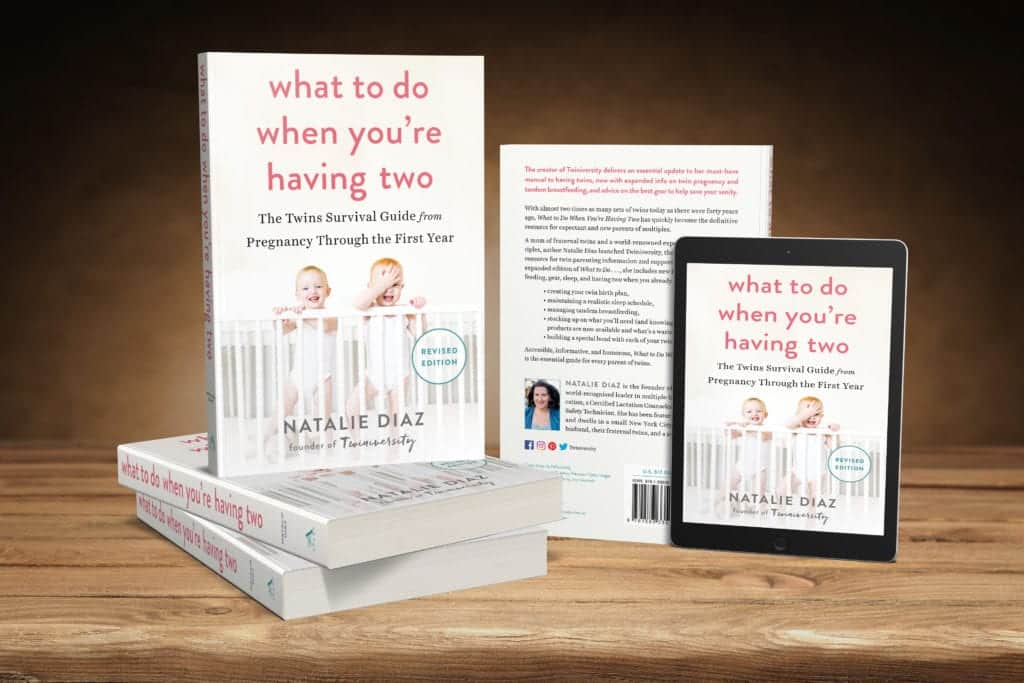
In What to Do When You’re Having Two: The Twins Survival Guide from Pregnancy Through the First Year, national twins guru and founder of Twiniversity (and twin mom herself!) Natalie Diaz provides a no-holds-barred resource about life with twins, from pregnancy and birth all the way through your duo’s first year of life.
Accessible and informative, What to Do When You’re Having Two
is the must-have manual for all parents of twins.
An excerpt from Twiniversity founder Natalie Diaz’s book, “What To Do When You’re Having Two“
Nanny Vs. Daycare Vs. Staying at Home
Before we move on from the topic of help, I want to talk about the option of staying home from work instead of hiring a nanny or sending the twins to daycare. Before making this decision, you need to figure out exactly what you’re making in a year and I don’t just mean what it says on your pay stub. How much are you spending on clothing, commuting, and any additional expenses? Compare that to how much you’ll really be paying your day care or nanny, including anything above and beyond a flat salary from health insurance to a cell phone. When it all shakes out, you may realize that you’re really only making $2,000 a year.
You have to decide for yourself what makes it worth it. Now, some people just don’t want to be stay at home parents or can’t because even after you look at the bottom line, the benefits at your job are too good to be true, and that is fine. In this case, you should go back to work even if you’re only breaking even. But if you’ve always toyed with the idea of staying at home, figure out what your bottom line is and see if it makes sense. With the additional cost of childcare, twin mamas are more likely to decide to stay at home when the babies are little, and I personally think that’s a great choice if you can swing it.
Photos of Twins 4 Months Old












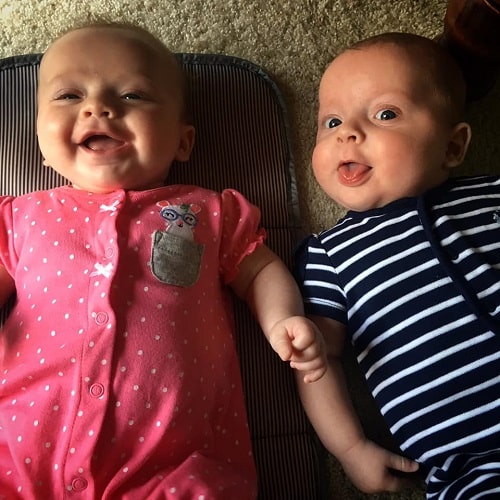




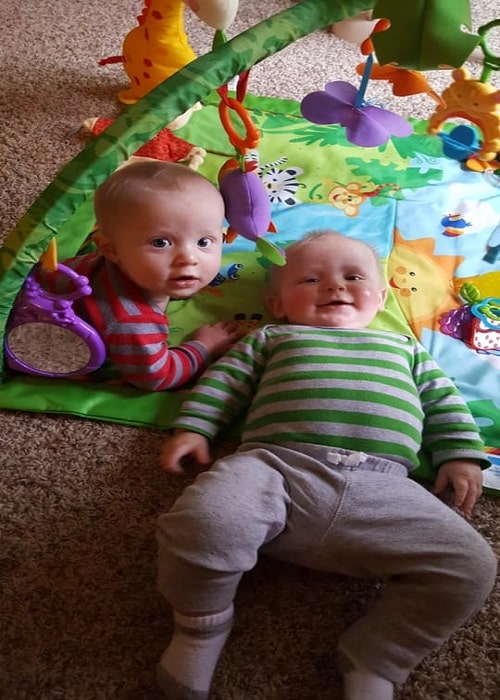

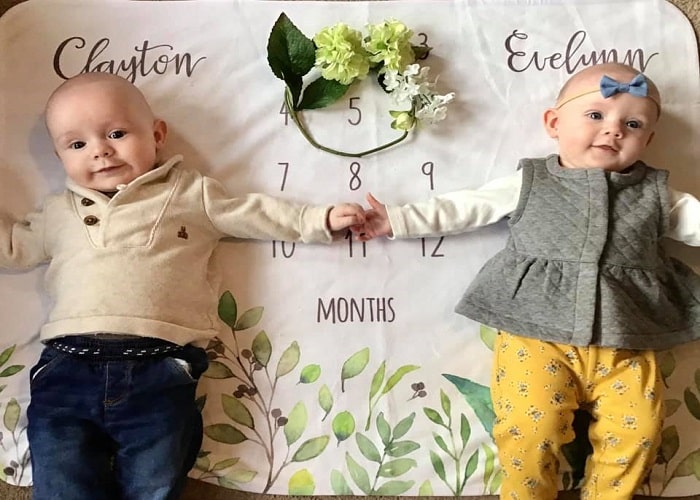


Return to the First Year with Twins Home
Sources
- Dr. Ilona Bendefy, Baby: Day by Day
- Dr. Frans X. Plooij and Dr. Hetty van de Rijt, The Wonder Weeks
- Marple, Kate, and Dawn Rosenberg. “When to Call 911: How to Tell If Your Baby Needs Emergency Care.” BabyCenter
- “Newborn Baby: When to Call the Doctor.” Cleveland Clinic
- “Developmental Milestones: 3 Month.” HealthyChildren.org
- “Physical Appearance and Growth: 4 to 7 Months.” HealthyChildren.org
- WhattoExpect.com “4-Month-Old Baby.” What to Expect, 2 Aug. 2019
- “How Often and How Much Should Your Baby Eat?” HealthyChildren.org
- “How Much and How Often to Feed Infant Formula?” CDC.org

